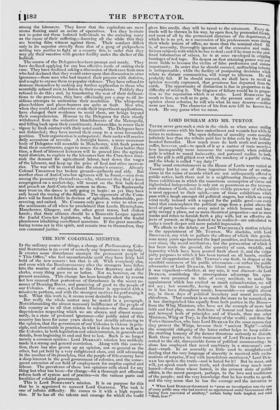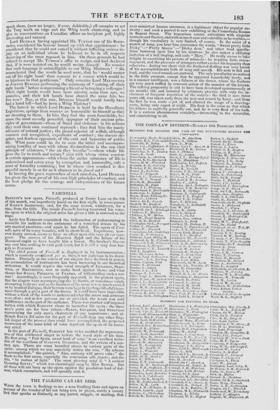LORD DURHAM AND MR. TURTON.
TRUTH never gets such a stab in the vitals as when some smiling hypocrite comes with his base underthrust and wounds her while he seems to embrace. The open defiance of morality costs morality infinitely less than the tribute paid her in false coin by the hollow- hearted formalist. How much more do both truth and amorality suffer, however, and—to speak of it as a matter of taste merely-- how incomparably more nauseous the compound, when political guile is added to moral insincerity, and personal malice to both, and the pill is still gilded over with the mockery of a public virtue, and the whole is called "my duty !"
The usual entertainments in the House of Lords were varied on Tuesday last by one of those ingenious imitations of an enthu• siesta in the cause of morals which are not unfrequently offered to public notice, both there and in a neighbouring theatre,—one of those exhibitions in which the monstrous assumption of virtue and highminded independence is only not so monstrous as the transpa. rent absence of both, and the positive visible presence of whatever is most opposed to their spint,—one of those exhibitions which pass with a laugh amongst old political stagers, but which on every mind really imbued with a regard for the public good—on every mind that contemplates the political stage from a point above the level of party tactics—on every mied in which honour and into. grity occupy a place, not as mere theatrical properties—not as mere masks and robes to furnish forth a play with, but as effective ob- jects of pursuit, as things desired to be realized—are calculated to make a much deeper and more painful impression.
We allude to the debate on Lord WINCHILSEA'S motion relative to the appointment of Mr. Tiorron. We disclaim, with Lord IleouonAm, any wish to palliate the offence of which this gentle- man many years ago incurred the legal penalties, and has sustained, ever since, the moral retribution ; but the persecution of which it has been made the ground, the quantity of cant, twaddle, and hypocrisy which have been poured forth about it, and the vulgar party purposes to which it has been turned on all hands, swallow up our disapprobation of' Mr. Trarroe's one fault, in disgust at the manifold meanness of his public adversaries—or rather the public adversaries of Lord DURHAM, his friend and patron. Whether it was expedient—whether, at any rate, it was discreet—in Lord DURHAM, considering the unscrupulous advantage his oppo- nents were prepared to take of every accident, to make the appointment which has excited so much animadversion, we will not say ; but assuredly, haring made it, his conduct in regard to it has been throughout manly, honourable—we might almost say, in these days of political treachery and moral cowardice, chivalrous. That conduct is so much the more to be remarked, as it has distinguished hint equally from both parties in the House— from the Whig Ministers, who have set the example of snore bad faith and foul play, more forfeiture of honour and base desertion and betrayal both of principles and of friends, than any other Ministers, Whig or Tory, in the history of the world; and from the Tories themselves, who hate Lord DURHAM for the same reason that they protect the Whigs, because their " ancient Night"—which the congenial obliquity of the latter rather helps to keep solid— the startling honesty of the former threatens seriously to disturb. Both these parties in their treatment of Lord DURHAM have re- sorted to the old, disreputable forms of political manceuvering : he alone has employed that novel machinery in a statesman's con-
duct—truth. In an assembly so little used to straightforward dealing that the very language of sincerity is received with excla- mations of surprise, if not with incredulous merriment,* Lord Due- ram has spoken the truth—and is hated for it! But he must, and will, yet speak much more truth, and doubtless reap much more hatred—from those whose hatred, in the present state of public affairs, is the surest passport, perhaps, to the love and confidence of the people ; and the very knowledge that he has truths to speak, and the very sense that he has the courage and the intention to
* When Lord DURHAM threatened to "press an investigation into the Me of every public man who had received an appointment under Government after having been convicted of adultery," certain booby lords laughed, and cried
"I-hear, hear I"
speak them, (now no longer, if ever, dubitable,) all conspire to set the Tory teeth on edge and the Whig teeth chattering, and to give to conversations on Canadian affitirs an incipient yell, highly interesting and natural. Lord DURHAM having appointed Mr. TURTON one of his Secre- taries, considered his honour bound up with that appointment : he considered that he could not cancel it without inflicting serious in- jury on an individual whom he believed to be in all respects deserving of the trust reposed in him. On these grounds he had refused to accept Mr. TraTos's offer to resign, and had declared that, if it were insisted on, be would resign himself. No wonder that such language is unintelligible to our Whig Ministers ! " He remembered that the words he used were, that he would sooner cut off' his right hand' than consent to a course which would be so injurious to that gentleman." Only conceive Lord Mammonism.; or JOHNNY RUSSELL perthrming the ceremony of " cutting off their right hands" before compromising a friend or betraying a colleague ! Their right bands would have been missing some time ago, we conceive, and their left hands have shared the same fate be- fore now ! Nay, at this rate, Briareus himself would hardly have had a hand left—had he been a Whig Minister !
The hatred in which Lord Ikuist M is held by the Hereditary Legislators, springs from sources as honourable to himself as they, are damning to them. In him they find the most formidable, be- cause the most morally powerful, oppugner of their ancient prin- ciples of government—those of fraud and violence : in his actions they read their own continual reproach : they find him the manly advocate of natural justice; the proud rejecter of selfish, although common and recognized, expedients of conduct ; the sincere de- spiser, and fearless opponent, of the cant and hypocrisy of public hth. What more could he do to earn the bitter and uncompro- mising hostility of men with whom dissiinulation is the one vital principle of existence, " the air they breathe "—whose whole life
gives the lie to truth and nature ? amen with whom virtue consists in certain appearances—with whom the entire substance of life is
undermined and eaten away by corruption and immorality, only a crust of thrmality remaining ; but in whose view conduct is dis- gracefUl merely in as far as it chances to helot/ad out ? In braving the grave reproaches of melt moralists, Lord Druirsst has given the best proof of his own high principles of conduct, and the best pledge fbr the courage and independence of his future course.



























 Previous page
Previous page